Two people with the same name — Biswajit Mitra — are creator and user of a software that’s making English learning butter-smooth for Kolkata’s lesser fortunate. The good news: they plan to bring it to other parts of the country, incuding ours
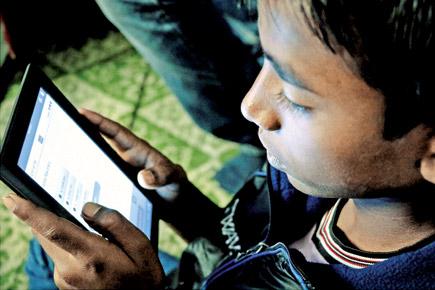
Two men with the same name, Biswajit Mitra, are taking English language to underprivileged children in West Bengal by making it simpler and relatable through a software that teaches English through vernacular. One of them, an IT professional by training, is the founder of NGO, Abheda Foundation, dedicated to change the education process in rural India; the other is the principal of a government-aided school, Kailash Vidyamandir, in Kolkata that has mostly underprivileged students.
ADVERTISEMENT
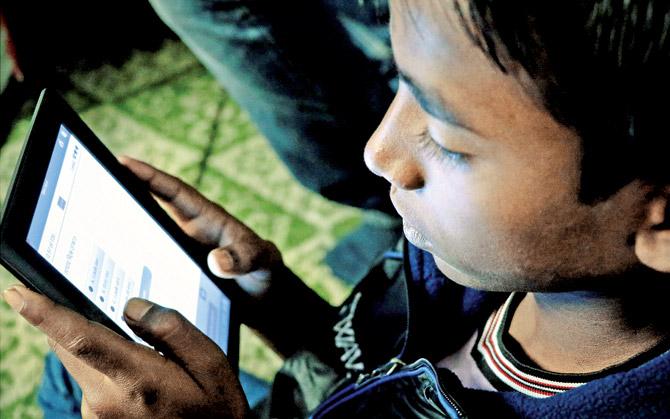
A student in a Kolkata school uses the Abheda software to get a grasp of English. Pic courtesy/Abheda Foundation
Mitra, who retired from Tech Mahindra as Global Head, designed the software keeping in mind possible problems of first generation English learners. His friend and principal of Kailash Vidyamandir extended support by using the software in his school and teaching English beyond the syllabus and school hours. Their aim is to make English an “enabler” rather than to equip students to pass tests.
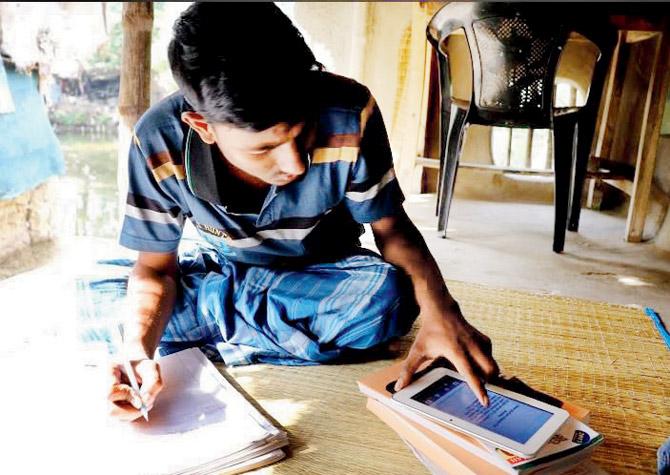
A student uses the Abheda software to study at home
“Our experience shows, however unfortunate, English is still a huge enabler and its knowledge among underprivileged students is dismal,” says Mitra of Abheda Foundation. He adds that this situation is possibly a result of the State Board aping boards like the ICSE or CBSE without trained teachers and infrastructure. “English knowledge of teachers is compromised, too, particularly in rural areas. We gained this experience working with rural schools,” he explains. He says that financially challenged students, who even got scholarships from the foundation for merit, were found wanting in basic English. It was to bridge this social gap between students with a command over English and those without it that the software Abheda was designed.
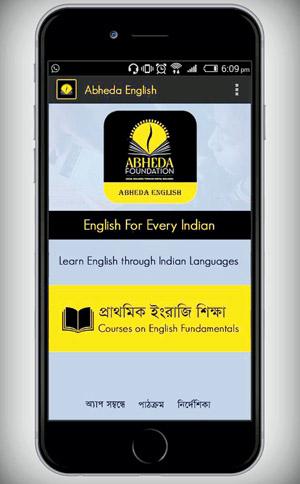
Front end of Abheda English. PICS courtesy/ Abheda Foundation
An idea takes shape
“Abheda means non-difference (in Sanksrit), and our organisation endeavours to effect this non-difference in society. Abheda believes that the prevailing differences in society can only be ironed out through education. And the need of the hour is digital education, as there are few teachers willing to teach the underprivileged and there is a fall in the quality of teaching. Add to that the acute need for appropriate teaching-learning material for the students in question,” he explains.
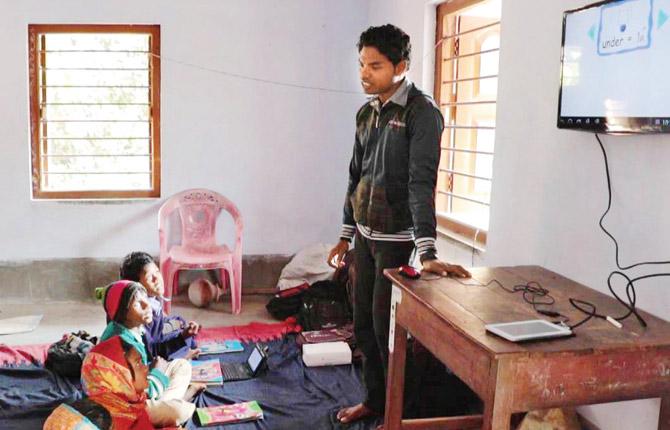
A class in Birbhum district of West Bengal uses Abheda software
“So Abheda develops and promotes extensive use of standardised digital content across the country to compensate for lack of quality teachers. But this content should be local to address needs of the target students,” he feels.
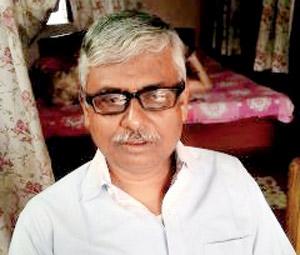
Biswajit Mitra, principal of Kailash Vidyamandir
Content developed this way, Mitra explains, is effectively delivered to students either through distributing low-cost tablets for self-learning or through physical teaching (by a teacher) when the tablet is attached to a TV (for larger projection). Abheda Foundation currently runs seven projects — four in Kolkata and three in rural West Bengal. Of these, one project is in self-learning mode, while the rest are in tablet-TV based teaching mode. Two projects are under Abheda while others are run in partnership with NGOs. Only one school in Kolkata is using this technology. “Kailash Vidyamandir has given us a chance to teach at their hostel on the school’s premises. The principal has included this teaching in their daily schedule,” he reveals.
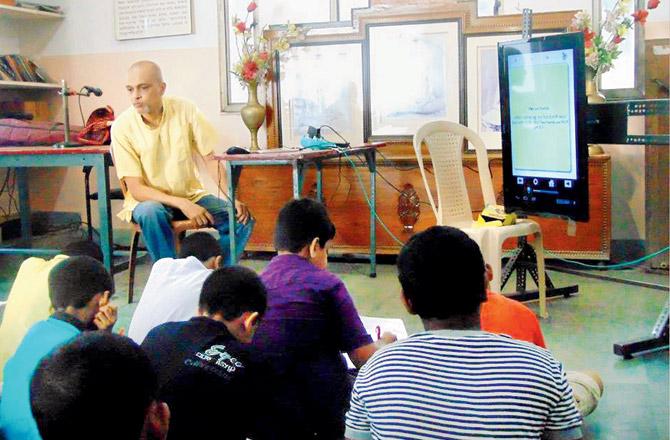
Biswajit Mitra, trustee of Abheda Foundation, teaches in Kolkata
Decoding Abheda
Biswajit, the trustee of Abheda Foundation, says, “We always took a bottoms-up approach as we believe that a student-oriented teaching is much more effective than a syllabus-centric one.”
They plan to increase the number of modules to 79 with special emphasis on conjugation, preposition and vocabulary. “These are the typical pain areas for Bengali-medium students. The basic objective of this free content is to enable learning of basic English in six to eight months in self-learning mode and in one to 1.5 years in classroom teaching mode (tablet-TV). These are meant for students of class five to eight. We are developing a new version of the software, also named Abheda English, which will include more intuitive quizzes and attractive content. This new version is presently undergoing beta testing and will be released in November on Google Play Store,” he informs.
This app, has more translations and comprehensions, and is meant for any student with a bit of knowledge of English words. “The app is free, and it has a curriculum and day-to-day lesson plan. It is developed to enable teachers and students to teach and self-learn respectively. Teachers are free to download the app on their android mobile and teach the contents for a fee. It need not be through Abheda Foundation,” he adds.
Nod from the principal
And Mitra, the principal is happy with the results. “Abheda helps teach English to our tiny tots. This software is student-friendly. The visual impact is praiseworthy,” he beams. He began teaching with Abheda in his school jointly with Biswajit, the trustee of Abheda Foundation, in the residential unit that houses over a hundred less privileged students. “Most students are first-generation English learners who have no grasp of the basics. So we felt that Kailash Vidyamandir is the ideal place to start. We jointly bought a TV and 12 tablets and started our journey.”
This method, he informs, has helped him teach students the language beyond just completing the syllabus. “The modules include a lot of fun activities like games, quizzes, interesting pictures which have been included for students to enjoy the learning process. In a way, we are being able to impart education in the real sense through this software.”
Classroom hurdles
He points out that lesser fortunate students can’t afford android phones/tablets however cheap. “So self-learning is not viable; the right NGOs will have to reach out for them, till the government (read: Ministry of Human Resource Development) takes it up,” he reminds us. He also points out there are other difficulties, like irregular attendance and false confidence created by the marking system. “Students weak in basic English tend to believe they are good in English, as they get high marks. Now if Abheda says, ‘You have to learn English better.’ the likely answer is ‘What better? We get good marks,’” he explains. But these problems are part of the process. With such success, they plan to explore new areas and all major regional languages.
“We plan to include Hindi and Santhali as medium of teaching, other than Bengali, by next March 2016,” he informs.
Log on to: abhedafoundation.org
 Subscribe today by clicking the link and stay updated with the latest news!" Click here!
Subscribe today by clicking the link and stay updated with the latest news!" Click here!






